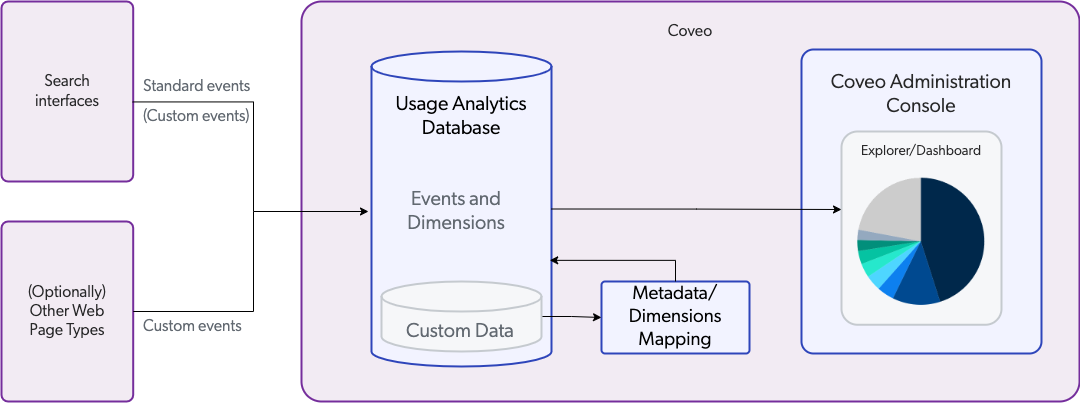Overview
Overview
Coveo Usage Analytics (Coveo UA) is an analysis tool designed to help you measure and optimize your Coveo solution. The Coveo-powered search interface captures and stores data in your Coveo organization. The data is then processed and made accessible through dashboards and explorers.
In addition to helping you measure your search solution adoption, usage analytics data also feeds Coveo Machine Learning (Coveo ML) algorithms to provide a more intuitive and personalized experience.
Coveo UA architecture
events performed by users in Coveo-powered search interfaces are recorded by Coveo UA in your Coveo organization. You can then use the Analytics section of the Coveo Administration Console (platform-ca | platform-eu | platform-au) to learn about user activity by reviewing usage events, metrics, and dimensions in explorers and dashboards.

Reports
A UA report is a customizable page in the Coveo Administration Console which helps you measure the usage of your search solution. Coveo offers 2 types of reports: dashboards and explorers. Both reports are compiled by UA report cards which are building blocks that display a data rendering of events, metrics, and dimensions recorded by Coveo UA in your Coveo organization. The report can be managed directly on the Coveo Administration Console (platform-ca | platform-eu | platform-au) page of the console.
Dashboards
A UA dashboard is a report type that includes UA dimensions and metrics data in graphical, tabular, or numerical form. Coveo organizations come with a default Summary dashboard that provides a quick overview of various data. Members with the required privileges can modify this dashboard in order to view the status and trends relevant to their organization (see required privileges).
The Analytics section of the Coveo Administration Console also offers the option to create a dashboard to include data specific to your needs. Its interface allows you to assess your organization’s search usage and can be structured by modifying the inclusion of specific cards, filters, and other elements.
Explorers
A UA explorer is a customizable report type that can be created within a dashboard and is designed to focus on a subset of data. Coveo organizations come with three preconfigured explorers: activity, relevance and content gaps. These default reports can be used as templates to create other explorers.
Events
A UA event is a set of parameters encompassing a single action performed by a user in a Coveo-powered search interface. An action is defined as a search, a click, a custom, or a view event. When an action occurs, the event metadata is sent to Coveo UA. Interfaces built with the Coveo JavaScript Search Framework automatically send events to your Coveo organization. Additionally, developers have the option to log their own UA events.
Metrics
A metric is a computed numerical value that applied as selectable criteria within UA reports. Metrics can be viewed as an indicator, a time series, or as values within a usage analytics data table, and are a direct result of recorded events. Metrics are grouped by event categories and leveraged in usage analytics report cards.
Dimensions
Leading practices
-
Ensure that you’re a member of a group with the required privileges to access and make changes in the Coveo Administration Console Analytics pages.
-
View your usage analytics data in different ways:
-
Review default reports and customize new ones.
-
Use the Visit Browser page in the Coveo Administration Console to review individual user visits.
-
-
Consider adding custom metadata to gather information specific to your environment. A developer can create a
customDataobject to push custom metadata to standard search-related events and custom events (see Coveo Analytics Component). You can then create matching custom dimensions in the Coveo Administration Console for each custom metadata to make it available to dashboards and explorers.ExampleYour community search provides results for your knowledge base (KB). In your KB system, a developer adds code to push KB page visit custom events and metadata (such as page title, site, URL, referrer…) in a
customDataobject.customData: { "pageTitle": "An awesome Page", "pageSite": "www.mysite.com", "pageUrl": "http://www.mysite.com/an_awesome_page", "pageReferrer": "http://anothersite.com/somepage", "pageLanguage": "English" }As soon as some page visit events are recorded, an administrator creates a custom dimension for each
customDatametadata so that they can be viewed along with other standard or custom dimensions in the Visit Browser (platform-ca | platform-eu | platform-au) and used in dashboards and explorers.Custom data can only be leveraged when using the UA Protocol. If you’re using the Event Protocol, keep in mind that custom fields have been replaced by predefined events and dimensions. To learn more about the available protocols, see Track usage analytics.
Ad blocker impact on UA data
Coveo UA is designed to improve your search experience on a designated search hub and therefore doesn’t follow users across other websites. However, certain internet filter lists may still contain references to Coveo files or usage analytics endpoints due to a broad "tracking" categorization. Using either a native or a third-party ad blocker which refers to these filter lists can result in Coveo’s JavaScript files or outgoing usage analytics requests being blocked. As a result, in this scenario, user events in the search interface wouldn’t be sent to Coveo UA. For information on how to ensure that all requests are sent to Coveo UA, see Implement a reverse proxy.